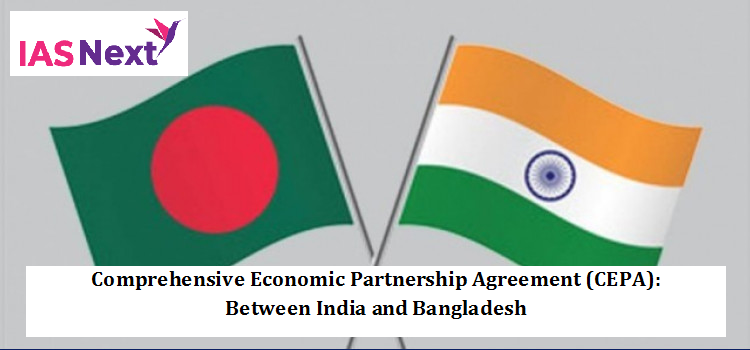CURRENT AFFAIRS
Get the most updated and recent current affair content on Padhaikaro.com
Comprehensive Economic Partnership Agreement (CEPA) Between India and Bangladesh
- IAS NEXT, Lucknow
- 09, Mar 2022

Context:
India is looking to advance the Comprehensive Economic Partnership Agreement (CEPA) with Bangladesh.
Four focus areas for strengthening India-Bangladesh relationship:
- Uninterrupted Supply chain is need of the hour: As H.E. Sheikh Hasina said, “Connectivity is productivity”; despite COVID-19, we maintained uninterrupted supply chain between the two countries. Also improving this connectivity further is imperative for expansion of our bilateral trade and realisation of the investment potential of Bangladesh and eastern India.
- Need to give more impetus to Joint Production of Defence Equipment: Our defence cooperation has not progressed, though India offered USD 500 mn line of credit.
- Explore potential areas of investments, like Textiles, Jute products, Leather & Footwear, APIs for Pharmaceuticals, Medical Equipment, Digital Health & Education Services, Agribusiness, Electronics, Renewable Energy, etc.
- India and Bangladesh can become ‘Pharmacy of the world’: During COVID-19, vaccines produced in India, – Covaxin & Covishield created a niche for themselves as safe vaccines. Time has now come for joint manufacturing of vaccines and other medicines!
NOTE: Bangladesh is India’s biggest trade partner in South Asia.
Comprehensive Economic Partnership Agreement (CEPA)
- A free trade agreement between two countries
- Covers negotiation on the trade in services and investment, and other areas of economic partnership such as trade facilitation and customs cooperation, competition, and Intellectual Property Rights.
- CEPA also looks into the regulatory aspect of trade and encompasses an agreement covering the regulatory issues.